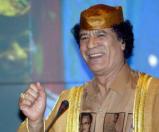African leaders announce agreement on common defense, security policy
By TODD PITMAN Associated Press Writer
 SIRTE, Libya, Feb 28, 2004 (AP) — In a bid to put decades of turmoil behind them, African leaders signed a sweeping defense and security agreement on Saturday that opens the way for the fledgling African Union to send joint forces to intervene in civil wars, cross-border conflicts and coup d’etats across the continent.
SIRTE, Libya, Feb 28, 2004 (AP) — In a bid to put decades of turmoil behind them, African leaders signed a sweeping defense and security agreement on Saturday that opens the way for the fledgling African Union to send joint forces to intervene in civil wars, cross-border conflicts and coup d’etats across the continent.
The lofty goal aims to prevent tragedies like the 1994 Rwandan genocide, in which over half a million people were massacred while Africa – and the rest of the world – stood by and did nothing.
But with funding short and the African Union already US$40 million in debt, the creation of such a force is unlikely to happen anytime soon, delegates said.
“The framework we have just signed includes the necessity to find collective answers to threats, whether internal or external,” Mozambique President Joaquim Chissano said in closing remarks at the two-day African summit in Sirte.
“But our efforts are not over. … We have to show a real commitment to the implementation of our decisions.”
Chissano told The Associated Press earlier that the union would establish a “standby force” of African troops that could be deployed to conflict zones at short notice.
He declined to give details, but draft copies of the agreement called for the creation of five regional brigades that would be deployed under the authority of two other bodies modeled on the United Nations, both of which are to be set up in the next several months.
The first is the African Assembly, or parliament. The second is the Peace and Security Council, Africa’s version of the U.N. Security Council.
Libya had proposed the creation of a single African army to defend the continent and react to instability within it, but many countries viewed the idea as unrealistic.
Ould Salek, a foreign minister for Western Sahara – a territory in southern Morocco recognized by the African Union – called the single army concept “romantic,” but said it would be debated again at the next summit in July.
Even with consensus, the standby force is unlikely to be formed soon. One delegate from Zimbabwe said skeleton brigades would be formed in 2006, but the force wouldn’t be ready for deployment before 2010.
Funding will be a major obstacle, and aid will be sought from donor countries including the United States, Japan and European states, Ould Salek said.
“There is a great need for African troops to intervene in cases of necessity. We must take on fully our duty to stop war in Africa,” Ould Salek said.
Until now, African nations have had no formal policy on how to react to conflict on the continent, sometimes with extremely tragic results.
About half a million people died in genocidal killings in Rwanda in 1994 while the African Union’s predecessor, the Organization of African Unity, did nothing. The OAU, long derided as a talking shop, was disbanded in 2002 after 39 years precisely because it was so ineffective.
Charles Muligande, who headed the Rwandan delegation on Saturday, was dismissive.
“They had the authority to intervene in 1994, the world had the authority, but they didn’t act,” Muligande said. “It isn’t about legal frameworks. They don’t prevent genocide. It’s about will. There has to be will.”
Saturday’s agreement doesn’t obligate African states to act but provides standards for them to uphold, including protecting democratically elected governments from coups. Crises would be debated at the union’s assembly, which could then dispatch the standby force to conflict zones.
The standby force could also be deployed to enforce disarmament programs and provide humanitarian aid.
Shortly after its creation in 2002, the African Union deployed several thousand peacekeepers from South Africa, Ethiopia and Mozambique to Burundi, but that country remains mired in conflict.
Also on Saturday, African leaders signed an agreement on a common policy to boost agricultural production and manage water resources.
The summit brought dozens of African presidents to Sirte, a Mediterranean city of broad boulevards, whose streetlights are bedecked with Christmas-like decorations – huge, illuminated green and white stars and flowers.
Drafts of the common security policies adopted listed possible threats the continent should unite to fight against. Among them – weapons trafficking, drug trafficking, the accumulation of weapons of mass destruction and international terrorism.
The leaders’ presence, along with that of visiting American civil rights activist Rev. Jesse Jackson, is the latest of a series of moves that have helped change Gadhafi’s long-standing image as a rogue dictator with terrorist ties.
In recent months, Libya has accepted responsibility for the 1988 bombing of an American airliner over the Scottish town of Lockerbie that killed 270 people, and agreed to dismantle its facilities for developing weapons of mass destruction.
“The nuclear arms race is a crazy and destructive policy for economy and life,” Gadhafi said Saturday. “We would like to have better economy and life.”
